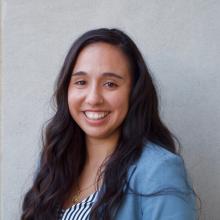June 2021 Spotlight on SRCD U.S. Federal Policy Fellow: Lorena Aceves, Ph.D.
Lorena Aceves is an SRCD Federal Executive Branch Policy Fellow who is placed in the Office of Head Start (OHS), Administration for Children and Families (ACF), U.S. Department of Health and Human Services (HHS).
As a first-generation Latina college student (i.e. first in my family to graduate high school and college), I was not aware that Ph.D. level scholars could have access to the amazing opportunity the SRCD Federal Policy Fellowship offers scholars to learn about the intersection of research and policy. I first learned about the fellowship program while completing a summer internship at the U.S. Department of Education’s Institute of Education Sciences. This internship gave me my first glimpse into the diverse types of work that happens within federal agencies. My internship supervisor, who is an SRCD fellowship alum, knew that I was still exploring career opportunities, and suggested I apply for the fellowship. Today, I am a first year SRCD Executive Branch Policy Fellow in the Office of Head Start (OHS) within the Administration for Children and Families (ACF), U.S. Department of Health and Human Services, working mainly in their Policy, Oversight, and Planning Division. OHS is responsible for the implementation of the Early Head Start and Head Start programs and for ensuring that children from low-income families have access not only to early childhood education, but also to social services that support child and family well-being. Head Start is one of the few federal programs that is implemented from the federal government directly to local grantees across the country. This means that federal funding goes straight to Head Start grantees across the U.S. who implement the program locally. I am grateful for this placement at OHS for a number of reasons, perhaps most notably because I am a Head Start alum.
One topic that has been central to many of my projects is the recruitment and retention of Head Start staff. Head Start is facing many issues related to staff recruitment and retention due to low wages, barriers to accessing higher education, and issues related to staff well-being. To tackle this issue, I examined past research on the state of the early childhood workforce to understand how these issues affect staff recruitment and retention. As a team, we have analyzed Head Start’s internal data to understand trends we are seeing within the Head Start program related to staff recruitment and retention. Given the federal to local nature of our work, we have had the opportunity to have ongoing conversations with OHS regional staff across the country to understand some of the issues they are observing within their programs at the ground level.
This year, all fellows have had the opportunity to experience the transition in federal Administrations. In program offices, including OHS, there are many exciting developments. The Biden-Harris administration is highly invested in early childhood education. Much of my work has remained the same, with the exception of preparing for the possibility of additional funding and thinking through how that funding (i.e., funding from the American Families Plan) could shape critical OHS projects moving forward. Another central role I have played related to projects concerning staff wages has been shaping our work to include considering the equity issues facing the Head Start workforce. Just like the rest of the early childhood workforce, much of Head Start staff are women of color that are affected by structural inequities and biases that make navigating the early childhood workforce even more challenging. With the current Administration’s central focus on equity, I have been implementing my expertise in equity approaches throughout all current policy projects in my portfolio.
As I reflect on these nine months in the fellowship program, there are two important lessons I have learned. The first has been how adaptable our skills as researchers can be, especially in a federal program office. I have found myself using my skills and training in innovative ways. For instance, in graduate school my research focused on Latinx families and adolescents. Now, I find myself easily pivoting content areas to early childhood education issues and being able to implement my research training and skills in ways that are applicable to OHS. The second lesson is how valuable it is to be in an environment with colleagues of diverse training, backgrounds, and experiences. OHS is an amazing place to work because not everyone has a Ph.D., which I find to be an asset. My colleagues come from so many unique backgrounds such as public health, social work, psychology, etc. In addition, many of my colleagues at OHS have either worked at all levels within OHS or in the broader Head Start world for 20+ years, including as local Head Start program directors and teachers. This is an invaluable experience that does not come from completing a doctorate program. All these diverse paths to OHS create such a rich collective of knowledge and skills which truly is what allows Head Start to be as successful as it is!
